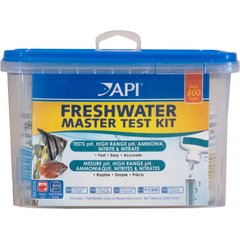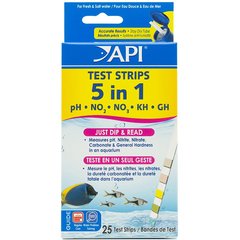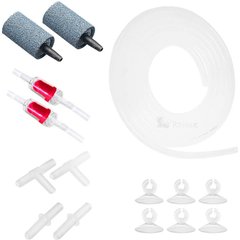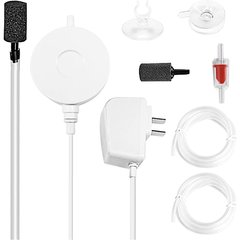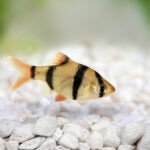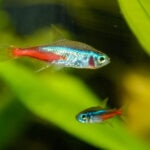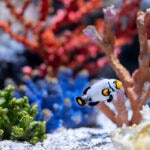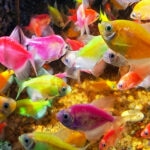Fish Stress: Signs, Causes, and Treatment
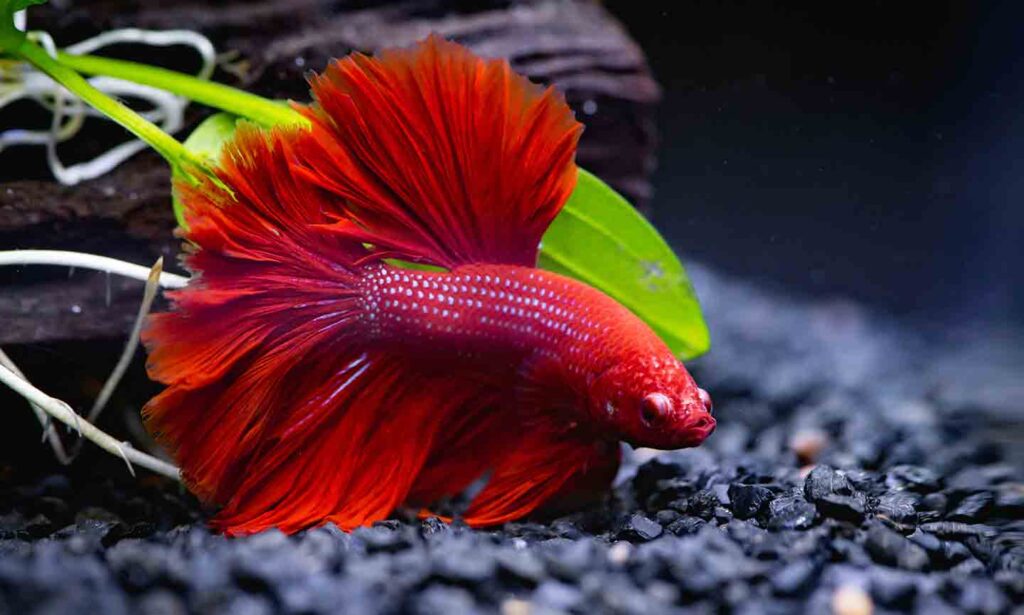
Photo by anurakpong/Getty
Key Takeaways
- Fish experience stress when their environment doesn’t meet their needs.
- Stress can weaken a fish’s immune system, making the more prone to illness or death.
- Common causes of stress include poor water quality, overcrowding, and incompatible tank mates.
- Erratic swimming, hiding, or a lack of appetite are all signs your fish may be stressed.
- Maintaining proper tank conditions can help prevent fish stress.
When conditions in the aquarium aren’t to a fish’s liking or, worse, fail to support their basic needs, the fish can become stressed. Like stress in humans, aquarium fish stress may or may not manifest with obvious signs.
Under the surface, however, chronic stress may weaken your fish’s immune system and increase their risk for illness and even death. Learning to identify the signs of fish stress is key for keeping your aquarium inhabitants happy and healthy.
In this guide, we’ll explore the subject of fish stress to determine what causes it, what symptoms it produces and what steps aquarium hobbyists can take to treat and prevent it.
Signs of Stress in Fish
The signs of fish stress include a wide range of physical symptoms and behavioral changes. According to Dr. Alex J. Hall, BVetMed MRCVS CertAqV, a certified aquatic veterinarian in New York City, the signs of stress in aquarium fish may even vary depending on the species.
In the early stages of a developing problem, your fish may not present any obvious signs of distress or illness. You may, however, notice subtle changes in behavior. For example: Is your fish less enthusiastic at feeding time? Are they hiding more than usual or swimming in a lower level of the tank? Even seemingly small departures from your fish’s typical behavior could be an indication that they are stressed.
Common signs of stress in aquarium fish include:
- Changes in color: Aquarium fish may change color in response to stress, either darkening in color or going pale. Oscars, for example, are well known for going pale when they are stressed or unhappy with something in their tank.
- Rapid breathing: Rapid gill movement or gasping at the surface for air is a sure sign that your fish are stressed by poor water quality or low levels of dissolved oxygen.
- Hiding: A stressed fish may spend more time hiding under or behind tank decorations. They may also stay toward the bottom of the tank instead of swimming freely.
- Loss of appetite: When stressed, many fish exhibit reduced feeding behavior.
- Aggression: Stress causes some fish to become more aggressive or territorial toward their tankmates. This is particularly common among semi-aggressive and aggressive species like cichlids, freshwater sharks and betta fish.
- Erratic behavior: Swimming erratically, rubbing on tank objects, having difficulty remaining submerged, and other unusual behaviors can be a sign of stress or illness.
Why Is My Fish Stressed?
An aquarium is an encapsulated environment and even small changes in temperature, water chemistry or water quality could stress your fish. Dr. Hall says, “Numerous factors can lead to fish stress and, in order to maintain the health of their fish, aquarium keepers must identify and manage these problems.”
According to Dr. Hall, the most common factors that contribute to aquarium fish stress are:
- Poor water quality: Low levels of dissolved oxygen or high levels of ammonia, nitrite or nitrate can be extremely harmful to fish. Some studies suggest Amazonian fish like cardinal tetras and marbled hatchetfish are particularly sensitive to poor water quality.
- Inadequate tank parameters: Even if the water quality is high, your fish may become stressed if the temperature, pH or hardness of the water is not to their liking. For example, mollies are typically bred in brackish conditions with high pH and hardness levels, yet are often kept in soft, neutral freshwater, which can be stressful for them.
- Overcrowding: Having too many fish in your aquarium can lead to territorial behavior, increased aggression from tank mates and competition for resources. It may also exceed the capacity of the nitrifying bacteria in the tank to neutralize ammonia, leading to issues with water quality.
- Incompatible tank mates: Aquarium fish should be kept with species with similar temperaments. For example, shy, slow-swimming species like angelfish may be stressed by highly active or fin-nipping tank mates like tiger barbs. It’s also unwise to keep species with different preferences for tank parameters together. For example, goldfish are coldwater fish who should not be kept with tropical fish like gouramis.
- Improper setup: Not providing enough places to hide can be stressful for some fish, while overcrowding a tank with plants and decorations might stress a different species. Even the wrong substrate can be a source of stress for aquarium fish. Coarse or sharp gravel, for example, can damage the delicate barbels of corydoras catfish.
- Inadequate diet: An improper or unbalanced diet can cause nutritional deficiencies and stress your fish. Not only should you know whether your fish are herbivores, carnivores or omnivores, but you should also provide a varied diet of appropriate foods within their particular dietary type.
- Unexpected environmental changes: While some fish like zebra danios are notoriously hardy, many fish will find sudden changes in water temperature, water quality or tank chemistry stressful. Fish keepers who don’t maintain stable conditions in their tanks may find their fish falling ill more often.
- Handling and netting: Aquarium fish should only be netted and handled when absolutely necessary—such as for transfer to a hospital tank or a new tank. Excessive handling can be very stressful for fish.
Keep in mind that different species of fish may be more susceptible to certain stressors. For example, a nocturnal species like the bristlenose pleco may become stressed if the tank doesn’t provide enough hiding places for daytime hours. Conversely, active swimmers like danios need plenty of open swimming space and may be stressed by an over-decorated fish tank.
Dr. Hall suggests that the most common cause of stress in aquarium fish is poor water quality. However, even if you perform regular water changes to keep your tank clean, your fish might still become stressed if the parameters aren’t to their liking. The further the aquarium environment is from the species’ natural habitat (or the conditions in which it was raised), the more likely it is to cause stress in your fish.

Su Arslanoglu/Getty
How To Treat Stressed Fish
The first step in treating fish stress is identifying the cause. Start by observing your fish for clues. Has their appetite changed? Are they having trouble swimming or breathing? Are there noticeable changes to their physical appearance? It’s also wise to check your tank equipment to make sure everything is functioning properly.
If observation doesn’t reveal the source of stress, it’s time to test your tank water. All aquarists should have an aquarium water test kit on hand for occasions such as this.
Recommended Products
High ammonia levels suggest a buildup of organic waste—try siphoning your substrate to remove accumulated detritus or clean your filter. Just don’t do both at the same time or you may kill a significant portion of the beneficial bacteria keeping your tank’s nitrogen cycle going.
High nitrate levels can also be toxic and, while removing accumulated detritus is important, you may also need to perform a series of water changes to bring the levels back down. Established aquariums are likely to have detectable levels of nitrate, but should be kept below 40-50 ppm, depending on your type of fish.
If your water test results are clear but you still have fish gasping at the surface, it’s likely that low oxygen levels are to blame. Check to make sure your filter isn’t clogged and consider adding an air stone, aka an aerator device, to increase surface agitation and facilitate gas exchange.
Recommended Products
In cases where fish stress is caused by disease, isolation and quarantine are recommended to prevent the spread of disease. When dealing with aquarium fish disease, Dr. Hall stresses the importance of consulting with an experienced aquatic veterinarian. Accurate diagnosis is essential for determining the proper source of treatment. If you give your fish the wrong medication, it could worsen their condition or introduce a new set of stressors in your tank.
Can a Stressed Fish Recover?
A stressed fish can recover as long as the cause of stress is remedied before the fish suffers any permanent damage. To improve the chances of recovery, Dr. Hall recommends keeping the fish in a quiet, dimly lit environment. When kept in clean water conditions and fed nutritious, easily digestible foods, many fish will recover quickly.
For example, fish suffering acute stress response due to low oxygen levels caused by a filter failure may recover in a matter of hours once proper oxygenation is restored. Fish that have suffered chronic stress may take longer to recover, especially if they’ve developed a secondary infection. The key is to minimize additional sources of stress while treating your fish.
Can a Fish Die From Stress?
If the source of stress isn’t identified and remedied quickly, fish can die from complications related to stress. Chronic stress weakens the fish’s immune system, making them more susceptible to potentially fatal fungal, bacterial and parasite infections.
For example, a fish who is already stressed by poor water quality may not be healthy enough to fight off an opportunistic parasite infection like ich. In a case like this, it’s essential to not only treat the white spots for the disease they represent but to address the underlying cause that made your fish susceptible to illness in the first place.
How To Prevent Fish Stress
Every aquarium is unique, but all fish can be affected by the same stressors. The best way to prevent fish stress is to tailor your aquarium to the specific needs of your tank’s inhabitants. From pH and water hardness to temperature and tank decor, do your best to mimic the conditions your fish would enjoy in the wild.
Here are some additional tips to keep fish stress levels at a minimum:
- Make sure your aquarium is equipped with proper filtration. When in doubt, purchase a filter rated for a tank one size larger than yours.
- Feed your fish only as much as they can eat in two minutes. Poor water quality is often related to uneaten fish food breaking down.
- Test your tank water on a weekly basis and respond to changes in water chemistry immediately. A timely water change could be enough to prevent serious issues.
- Monitor your fish and take action if you notice aggression or territorial behavior. Rearranging the tank or adding decorations may help but, in some cases, you may need to separate aggressive fish.
- Don’t rely on chemical additives to address tank issues. The effects of these products can be hard to predict and may lead to other issues that could stress your fish.
Fish can be stressed by any number of things, but you can protect your tank’s inhabitants by starting any new aquarium on the right foot. Take the time to fully cycle your aquarium before adding inhabitants, and add new fish slowly to avoid overloading your tank’s biological filter.

